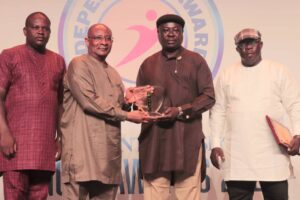OPINION; THE ONLY OBVIOUS VISION OF NIGERIAN POLITICAL LEADERS
By Zik Gbemre
According to the holy writ, “Where there is no vision, the people parish…” In other words, for the assured progress of any society and its people, the privileged political leaders are supposed to have people-oriented and people-driven visions. Without this, the people as the subjects, will continue to suffer untold hardships and sufferings. Sadly, that has been the lot of the Nigerian state, as far back as we can remember. Now, it is not that our past and present political leaders lack vision, the question is, what exactly are their visions and goals as a Government, across all levels?
If you look very critically, like I did, you would realize that the very obvious vision of Nigerian political leaders, is to have Plans On Paper without Execution; To make bogus campaign promises without the Intention and Will to implement them; and the one we want to talk about here more – To establish higher institutions without providing the required adequate facilities and infrastructure that would make the undergraduates eventually become employable graduates, and also have a system and structure that would absorb/take in the graduates when they leave school. This has left us with an education system that keeps producing graduates every year that are without the requisite employable skills, and nowhere to have them gainfully employed.
For instance, of what relevance is the establishment of the Nigerian Maritime University in Okerenkoko, Gbaramatu kingdom of Delta State, when the question of what exactly will the graduates do after graduation, is very uncertain and hopeless? I mean, will the graduates from the Maritime University go and paddle wooden canoes or what? This question is important because if we look all around us, especially in Delta State where the said University is located, what Maritime infrastructure and maritime businesses are there for the graduates from the school to find a place to practice what they have learnt, and make a decent living for themselves? If the Government’s priority is to establish a Maritime University in the South-South region, then the Government ought to have followed such a plan with massive investments in the regions Maritime industry. Where will the graduates from the Maritime University work? Where will they practice the business aspect of what they have learnt, to earn a living for themselves?
These are questions, our political leaders never put into consideration when they come up with their one-sided visions. Is it not appalling that a country as big as Nigeria, which is blessed beyond measure with so many coastal regions, especially in the Delta region areas of Delta State, is only known to have two functional Ports – Onne and Lagos Ports? Whereas, there are many other Ports, like that of Warri Port, which have been left to decay and not function as they ought to. Why should we have the concentration of Maritime activities within the Maritime industry in Onne (Port-Harcourt), and Apapa, Tin can (Lagos) alone – leaving other Ports like Delta Ports Complex not working as they should? Is it not a sad commentary that majority of the goods imported into Nigeria come only from the Lagos Ports? The one that baffles us most is the policy that has made the Onne Port the only Port in the country to receive Oil and Gas Cargoes. Thereby rendering the Warri Ports useless and unutilized, despite being closest to the country’s Deepsea areas where the Oil and Gas exploration and production business activities are predominant. This lopsided ‘Political Economy of Nigeria’, is definitely not good for the country, as it will not encourage any significant economic growth.
Of course, this was borne out of Nigerian Governments that are often without people-oriented-visions, which ought to outlive them. This was the same way they established the Federal University of Petroleum Resources (FUPRE) in Effurun, Delta State. Which, according to them, is a specialized university with a conducive learning environment primarily established to build and produce manpower and expertise for the oil and gas sector. But then again, nobody thought about how will the graduates from this school, contribute their quota toward the development of the society? Especially when there are evidently little or no oil and gas infrastructural base and business structures, that would create the platform and avenue for these graduates to exercise and practice what they have learnt. As we speak, there are no standard Petrochemical structures and companies in the country that can absorb a considerable number of graduates from this school. No standard and functional refineries – as the only Warri Refinery in this part of the country, is mostly on shutdown mode. No gas infrastructures and encouraging business environment that would even attract foreign and domestic companies and investors to create employment opportunities in these areas. one begins to wonder where then will the graduates from the said Federal University of Petroleum Resources, work in or practice what they have learnt in school? Will they end up working in filling Stations as fuel Attendants?
Is it not a shame that up till now, Nigeria is still heavily dependent on imported petroleum products? Now, they are making so much noise about the Dangote Refinery under construction in Lekki, Lagos, which when completed, will have a capacity to produce about 650,000 barrels per day of crude oil. But then again, will this absorb a quarter of the graduates being produced and deposited into the sector on a yearly basis from the said Petroleum University? Then again, the said Dangote Refinery is located in Lagos, which is an already overpopulated metropolitan city, far away from graduates of the said University. So, when we see some of our elites overly excited about some of these developments, we are seriously worried because we wonder how shallow minded can they be. How can one be excited about the establishment of higher institutions, when the question of where will the graduates from such institutions exhibit what they have learnt, is never considered and put into perspective? No one is wondering and asking the very important questions of where will these graduates practice and exercise what they have learnt in school?
The one that I find quite unbelievable, was the recent Federal Government’s N18billion University of Transportation inauguration in Daura, Katsina State, by President Muhammadu Buhari. According to them, the newly established institution would bring rapid development to the transport sector as well as generate both academic and non-academic employment opportunities for Nigerians. They even went on to state that the institution will pave the way for the domestication of railway engineering, and bridge the technology and skill gap in the railway and transportation sector. The question is, how possible is all of this? It is not enough to come out and give us big grammars and laudable policies on paper. The question is, how will all of this be possible when the nation’s transportation sector is nothing to write home about?
There was even the well publicized 2019 National Transport Summit with the Theme: “Unlocking The Potentials of Transportation For Sustainable Development.” Of what need is the said national transport summit, and the establishment of a University of Transportation, when
the three means of transportation in Nigeria, which includes land, water and air, are grossly underdeveloped and lacking in so many things? What is basis of all of this, when the “basic transportation infrastructure” like good network of roads, modern day international-standard airports, efficient and reliable railway/train system – all of which are meant to ‘ease all the existing transportation problems’ faced by the Nigerian masses; are either in a deplorable state, or completely absent? The question again is, what then will the graduates of the said University do after graduation, when the Government has not demonstrated the Will to heavily invest in the transformation the nation’s transport sector?
How can a country as blessed as Nigeria not have national modern-standard Airports like we see in other developed countries in Europe, America, Asia and United Arab Emirates (UAE)? Today, there is no standard Operational international-modern airport in Nigeria that one can boast of and be proud about? The airports in Lagos and Abuja, cannot compete in terms of modern infrastructure and service delivery, like their counterparts in developed places like London, and some African countries. London alone has five standard operational airports, and all the airports in Nigeria put together, cannot equal the operations of the Heathrow airport in London. The five airports in London alone are namely: Heathrow airport, Gatwick airport, Stansted airport, London city airport and Luton airport. London has 270 train stations. Popular amongst them is the St. Pancreas International train station that daily takes passengers across the entire Europe. Besides this, London also has Metro Stations. And the city is also known for having reliable Bus Stations and Double-decker busses running every streets/roads of London, taking passengers. In fact, for every two to five minutes, a bus arrives to pick passengers. If any place should have a University of Transportation, it should be the UK, United Arab Emirates (UAE), France, etc. and not Nigeria.
Even cities like Warri, which happens to be the ‘commercial nerve center’ of Delta State, do not have a standard airport. Yet, some Nigerians are excited that a University of Transportation has been established. If developed societies like the UK, France, US, Germany, China, UAE, US, Japan, etc., where there are the availability of reliable transport systems from underground tubes/railways/subways, air transport, good road networks – were to establish such a University, or organize such a Transport Summit aimed at further improving their already well-established reliable transport systems; then we would understand, and see it as being in order. But we would not understand the essence and basis of establishing such a University, or organizing such a Transport Summit in Nigeria where, past/successive/present Governments have refused to, and are very unwilling to holistically address the transportation problems across the country.
Again, what will the graduates of the said University of Transportation ‘manage’ when they leave school? Will they be riding Keke (tricycles) or what? The major significant difference between most cities in Nigeria and places like Dubai, London, New York, Manchester, Paris, Detroit, etc., is the availability of high standard modern infrastructure and conducive/attractive business environment. Nigerian political leaders and elites/technocrats should be reminded that the country cannot develop, address the problem of unemployment/underemployment, or attain any significant development worth recognizing at the global scale; with the establishment of higher institutions, or mere talk shows, Economic Summits, Conferences, Workshops and policies on paper. It is time they take precise, well-thought-out people-oriented ACTIONS for the good of all and sundry. A university of Transportation in a place like UK would be seen as meaningful because the graduates would have places to work upon graduation. What Nigeria desperately needs is good and reliable transport infrastructure and not a University of Transportation. What Nigeria needs is more oil and gas infrastructure like standard refineries and gas projects, like the Gas-To-Liquid Plant in Ras Laffan Industrial City, 80km North of Doha, Qatar, and not a University of Petroleum Resources. What Nigeria needs is to develop a Maritime infrastructure in this part of the country, and not a University of Maritime Studies/Maritime University. The Okwagbe natural Ports in Ughelli South LGA of Delta State, which was used by the Portuguese and the British during the colonial era, is still not yet developed to become a Seaport. With all of this, how do we expect to be developed as a nation?
Zik Gbemre.
National Coordinator Niger Delta Peace Coalition
We Mobilize Others to Fight for Individual Causes as if Those Were Our Causes




